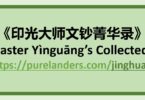甲初、序分
A1: Preface Section
分二:初、通序,二、别序。
Divided [Into] Two [Parts]: First, Common Preface, Second, Separate Preface.
乙初、通序
B1: Common Preface
中二:初、标法会时处,二、引大众同闻。
Within [With] Two [Parts]: First, Stating [Of] Dharma Assembly’s Time [And] Place, Second, Citing [Of] Great Assembly Together Hearing.
丙初、标法会时处
C1: Stating [Of] Dharma Assembly’s Time [And] Place
【经】:如是我闻,一时佛在舍卫国祇树给孤独园。
[Sūtra]: Thus is [as] I [have] heard. [At] one time, [the] Buddha [was] at Śrāvastī city’s Jeta Grove [And] Giver[-To-The-]Lonely Garden.
【解】:「如是」,标「信顺」。
[Explanation]: ‘Thus’, states [to ‘have] faith [in and to] follow [accordingly]’.
「我闻」,标「师承」。
‘I [have] heard’, states ‘[from the] teacher received’.
「一时」,标「机感」。
‘One time’, states [the] ‘opportunity [and] response’ [being appropriate].
「佛」,标「教主」。
[The] ‘Buddha’, states [the] ‘master teacher’.
「舍卫」等,标「说经处」也。
‘Śrāvastī’ [and] others, states [the] ‘place [the] sūtra [was] spoken’.
实相妙理,古今不变,名「如」。
True Form’s wonderful principles, [from] ancient [times till] today unchanging, [are] named ‘thus’.
依实相理, 念佛求生净土,决定无非,曰「是」。
Relying [upon] True Form’s principles, [being] mindful [of] Buddha [to] seek birth [in his] Pure Land, [which is] definitely without mistake, [is] said [as] ‘is’.
实相非我非无我,阿难不坏假名,故仍称「我」。
True Form [is] not ‘I’ [and] not without ‘I’. Ānanda, not destroying [his] false name, thus [is] still called ‘I’.
耳根发耳识,亲聆圆音,如空印空,名「闻」。
[With the] ear root giving rise [to the] ear consciousness, personally understanding clearly [the Buddha’s] perfect voice, like emptiness sealing [upon] emptiness, [this is] named ‘heard’.
「时」无实法,以师资道合,说听周足,名「一时」。
‘Time’ [is] without true dharmas, [yet] with [the] teacher [and] students’ paths combined, [with] speaking [and] hearing complete [and] adequate, [this is] named ‘one time’.
自觉觉他,觉行圆满,人天大师,名「佛」。
Self-awakened [and] awakening others, [with] awakening’s practices perfected, [as] human [and] heavenly [beings’] great teacher, [he is] named ‘the Buddha’.
「舍卫」,此云「闻物」,中印度大国之名,波斯匿王所都也。
[On] ‘Śrāvastī’, this [is] called ‘Famous Objects’, [the] name of central India’s great country, [also] King Prasenajit’s place [as its] capital.
匿王太子名「祇陀」,此云「战胜」。
King Prasenajit’s Prince [was] named ‘Jeta’. This [is] called ‘Battle Victory’.
匿王大臣名「须达多」,此云「给孤独」。
King Prasenajit’s great minister [was] named ‘Sudatta’. This [is] called ‘Giver-[To-The-]Lonely’ [i.e. Anāthapiṇḍada].
给孤长者布金买太子园,供佛及僧,祇陀感叹,施余未布少地,故并名「祇树给孤独园」也。
[When the] Elder Giver[-To-The-]Lonely spread gold [to] buy [the] Prince’s garden, [to] offer [to the] Buddha and [the] Samghā, [Prince] Jeta exclaimed [in surprise, and] gave [the] remaining little land yet [to be] spread, thus [is the place] together named ‘Jeta Grove [And] Giver[-To-The-]Lonely Garden’.
– 净土宗九祖澫益大师
《佛说阿弥陀经要解》
– Pure Land Tradition’s 9th Patriarch Great Master Ǒuyì
(Essential Explanation [Of The] Sūtra [In Which The] Buddha Speaks [Of] Amitā[bha] Buddha)
Namo Amituofo : Translation by Shen Shi’an
相关文章
Related Articles:
下文:《阿弥陀经》法会有何罗汉?
Next Section: Who Are The Arhats In The Amitābha Sūtra Assembly?
https://purelanders.com/2019/09/21/who-are-the-arhats-in-the-amitabha-sutra-assembly
《佛说阿弥陀经要解》全英译
Complete English Translation Of ‘The Essential Explanation On The Amitābha Sūtra As Spoken By The Buddha’
https://purelanders.com/yaojie





